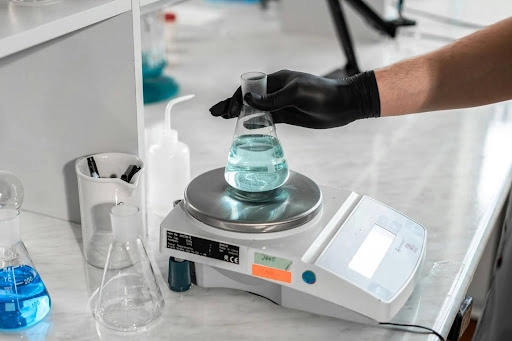In the industrial and academic sectors, precise measurements are an essential aspect where the accurate calculation of weight can determine research, production, and quality control. The laboratory balance is a key to achieving accurate results, hence becoming a crucial tool in the fields of pharmaceutical research, industrial manufacturing, and others. The following article addresses the importance of laboratory balance systems in various industries and what should be considered in the selection of the right balance.
Importance of Laboratory Balances
A laboratory balance is designed to measure small weight samples with high accuracy. These balances are widely used in research labs, educational institutions, medical testing facilities, and industrial production lines. Whether used for chemical analysis, formulation of medicines, or quality testing in manufacturing, laboratory balances ensure precision and reliability in measurements.
Applications in Industrial Use
1. Pharmaceutical Industry
In pharmaceutical research and production, accuracy is crucial. Even a minute miscalculation in measuring the ingredient may affect the drug composition and its effectiveness. Laboratory balances help ensure that every formulation meets the highest quality standards and regulatory requirements.
2. Food and Beverage Industry
Food manufacturers rely on laboratory balances to measure ingredients for product consistency. From calculating spice mixtures to checking the weight of processed goods, these balances help maintain uniformity and comply with food safety regulations.
3. Chemical Manufacturing
The chemical industry necessitates exact measuring for safe, effective production. Laboratory balances in the production setting help determine levels of chemical reagents and formulations so the concentrations can achieve the proper thresholds.
4. Jewelry and Precious Metals
Laboratory balances are commonly used in the jewelry industry for weighing gold, silver, and other precious metals. These balances offer high precision, ensuring accurate pricing and compliance with weight standards.
5. Automobile and Engineering
Laboratory balances in manufacturing sectors such as automobile and engineering are used to weigh raw materials to ensure consistency in the production process. High-quality output is assured by accurate weight measurement, meeting industry standards.
Applications in Academic Use
1. University and Research Laboratories
Educational institutions use laboratory balances for experiments in chemistry, physics, and biology. Students and researchers rely on these devices to measure chemicals, analyze samples, and conduct scientific studies with precision.
2. Medical and Healthcare Research
Medical research in laboratories requires well-balanced equipment since everything diagnosed or experimented on at the laboratory level has an implication on the accuracy or otherwise of the results. It is very important when weighing minute samples in medicine, chemical solutions, and pharmaceutical formulations.
3. Agricultural Research
Scientists studying soil composition, fertilizers, and pesticides use laboratory balances to measure compounds with accuracy. Proper measurement helps in determining soil nutrient levels and formulating effective agricultural products.
Types of Laboratory Balances
1. Analytical Balances
Analytical balances are widely used in laboratories for chemical analysis and pharmaceutical research. They are designed for high-precision measurements and are read up to four decimal places, making them suitable for small mass samples.
2. Precision Balances
Precision balances offer slightly lower accuracy than analytical balances but are suitable for industrial applications where higher weight capacities are required. They are used in quality control and material testing processes.
3. Micro and Semi-Micro Balances
Microbalances and semi-microbalances are used for measuring extremely small masses, often required in advanced scientific research and chemical testing.
4. Top-Loading Balances
These balances are commonly used in industrial applications where high-capacity weighing is needed. They offer moderate precision and are ideal for weighing bulk materials.
Key Features to Consider When Choosing a Laboratory Balance
1. Accuracy and Precision
Choose a balance that meets the accuracy requirements of your application. Analytical and microbalances offer the highest precision while top-loading balances provide greater weight capacity.
2. Weighing Capacity
Consider the maximum weight the balance can measure. Laboratories dealing with small sample sizes require low-capacity balances, whereas industrial applications may need higher-capacity models.
3. Calibration Options
Look for balances with automatic or internal calibration options to ensure consistent accuracy over time. Regular calibration is essential for maintaining reliable measurements.
4. User-Friendly Interface
A digital display, keyboard or touch control, and intuitive menu options improve ease of use, making the weighing process more efficient.
5. Durability and Build Quality
Industrial environments may require balances with robust construction resistant to chemicals and environmental factors. Stainless steel platforms and dust-proof enclosures enhance longevity.
6. Compliance with Industry Standards
Ensure the balance complies with industry regulations and certification requirements, particularly in the pharmaceutical and food manufacturing industries.
7. Connectivity and Data Transfer
Advanced laboratory balances offer USB or Bluetooth connectivity, allowing integration with computers and laboratory management systems for seamless data recording.
Conclusion
A laboratory balance is one of the most basic tools used in both industrial and academic applications, where accuracy and reliability are ensured for weight measurements. From pharmaceutical research to manufacturing and scientific studies, choosing the appropriate laboratory balance will increase efficiency and accuracy.
PHOENIX provides high-quality laboratory balances that are designed to meet the needs of both industrial and academic users with dependable performance and precision.



